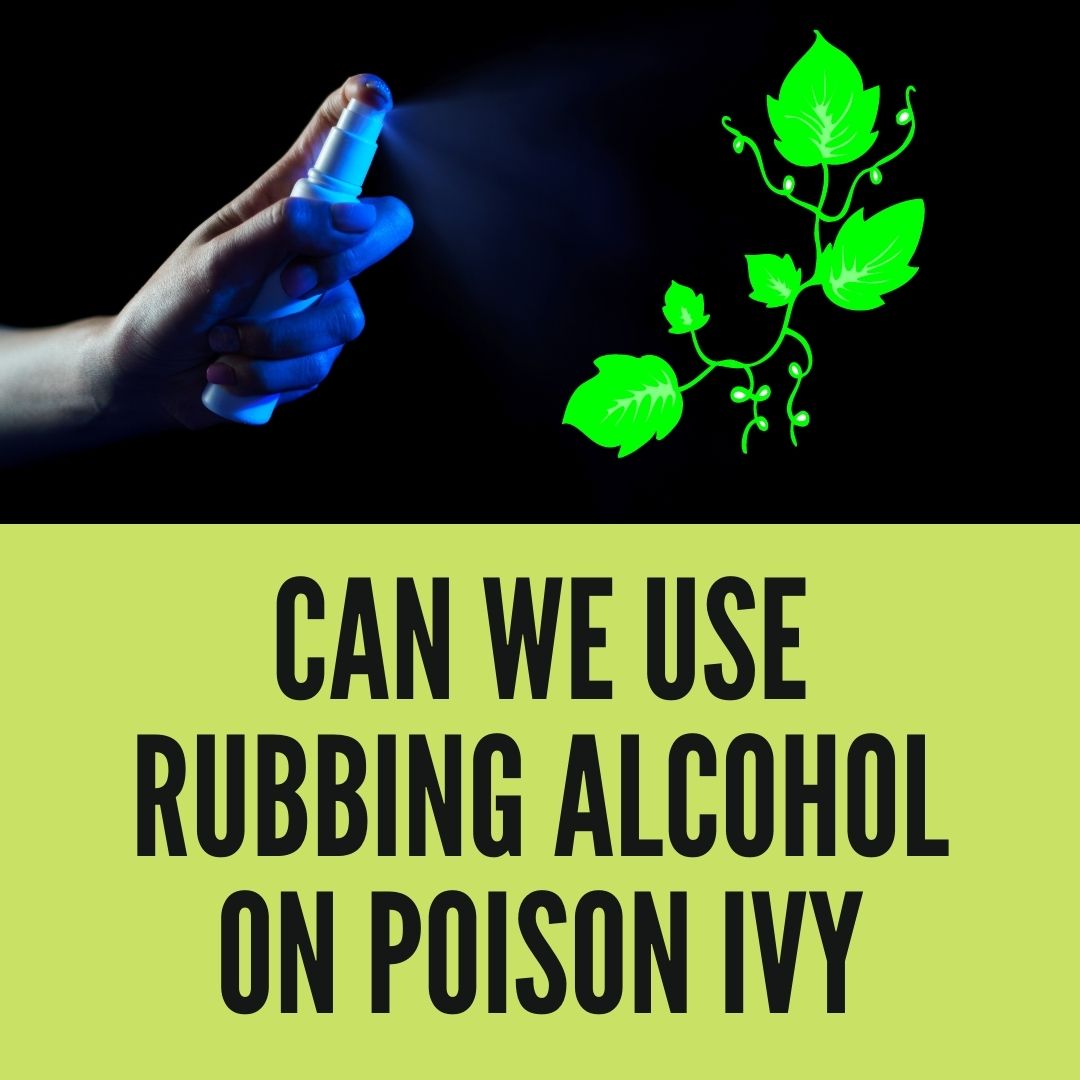
One of the old and common sayings, “Leaves of three, let them be”, is what hikers swear by. On your trip to nature or even in your backyard, you must have encountered Poison Ivy multiple times.
There must also be times when you had an unfortunate physical encounter with Poison Ivy. How did you manage? Suffered alone? But when you have a bottle of Rubbing Alcohol at home, what’s there to worry about.
Does Rubbing Alcohol Kill Poison Ivy?
Poison Ivy is literally everywhere in North America. Even if you explore Asia and Africa, this is one of the unwanted yet common plants you will find. If there’s one in your backyard as well, chances are you might want to destroy it.
Rubbing Alcohol comes in most handy for killing Poison Ivy at the home level. Rubbing Alcohol here behaves as a herbicide that will penetrate into the roots of Ivy and will kill the plant from inside.
However, because it is a very strong plant, you might want to use higher concertation than usual.
How can I use Rubbing Alcohol for killing Poison Ivy?
91% or 99% Isopropyl Alcohol will behave better for killing Poison Ivy. Because of its higher concentration, it will attack strongly the plant giving it no way to fight against the chemicals.
Here’s the step-by-step method of killing Poison Ivy using Rubbing Alcohol:
- Firstly, locate the Poison Ivy plant. It generally grows low on the ground and has 3 green/ red leaves in a bunch. Its middle leaf is always longer than the other two. Ivy leaves are either smooth-edged or toothed and can be both shiny and dull. You can see tiny buds of white or greyish berry flowers upon them during the spring season.
- Once you know where the plants are, gather your tools. You will require a sharp shovel, a spraying machine, plant scissors, long heavy-duty Rubber gloves, work boots, and fully covering clothes for extra safety from the plant. Depending upon the number of Poison Ivy plants, you will also require a competing quantity of Rubbing Alcohol.
- Take your spraying machine and fill it with the required quantity of Rubbing Alcohol. For that, first, get an idea of how many Poison Ivy plants you want to kill.
- Now spray the Rubbing Alcohol solvent over the Poison Ivy plants, maintaining a safe distance for yourself.
- Once Rubbing Alcohol has done its work, the next day, get ready for the next step.
- Wear your heavy-duty Rubber gloves and Boots. Make sure you are covered enough that no part of Poison Ivy can touch your skin.
- Now using Plant Scissors and a shovel, try cutting and removing the maximum Poison Ivies you can.
- Once done with all of that, take the Rubbing Alcohol solvent again and spray it nicely on the roots. Make sure you leave no roots behind, as even with a little live root left, the plant can grow again.
- After 3 to 4 days, check for the dead roots, remove them from the soil and discard them.
Is it OK to put Rubbing Alcohol on Poison Ivy?
should I put Rubbing Alcohol on Poison Ivy rash? Rubbing Alcohol is a common household chemical known for its day-to-day anti-bacterial and disinfectant usage.
If you come in Physical contact with Poison Ivy at any moment in time, you can use Rubbing Alcohol wipes to clean that area.
Doing this immediately after exposure will help remove urushiol from the skin, resulting in lowering the discomfort.
However, if you have already developed rashes and blisters from Poison Ivy, avoid using Rubbing Alcohol solvent, wipes, or other products. Alcohol can damage your tissues and delay the healing process when the damage is already done.
How can I treat Poison Ivy rashes and blisters on my skin?
Blisters and Rashes from Poison Ivy can prove real-time painful. And without the right treatment, any such condition will subside.
However, by following some quick home remedies, you can either keep the skin condition from developing or, for the least, from them giving you burning and paining sensations.
As soon as you come in skin contact with Poison Ivy, clean the area with Rubbing Alcohol. Or, wash the infected area under soap and water, ensuring no plant oil leaves back into your skin.
Further, avoid scratching the area and consider using wet or cold compressed. Doing so will provide immediate relaxation from pain, burning, and itching.
Now use any Hydrocortisone creams on rashes and blisters. If required, oral medicines, including diphenhydramine (Benadryl), will help in reducing inflammation internally.
However, consult your doctor before taking such medicines as they might also cause drowsiness to some.
Or, use Bentonite clay and water in the infested area. However, only use the pure version of it.
When to speak/ visit a doctor:
While most of the Poison Ivy rashes and blisters go away at home on their own, some may need medical attention. Here’s when you should see a doctor,
- If irritation symptoms are severe.
- If rashes have spread over 20% of your body.
- If rashes are near the mouth or near the genitals.
- If you notice no improvement even after 7 to 10 days.
- If itching and burning sensations are subsiding and you are unable to manage them.
- If blisters are developing off white and yellow pus.
Should I pop Poison Ivy blisters?
No, never pop Poison Ivy blisters or blisters of any source for that matter. Regardless of how painful your blisters are, remember open blisters are even more painful.
Also, due to their exposed nature, open blisters are prone to infection, which can also result in blood poisoning. Treat the blisters or let them dry out on their own.
Are Poison Ivy rashes contagious?
No, Poison Ivy rashes or blisters aren’t contagious, and thus they won’t spread from individual to individual.
However, you can still catch them from plant oil that may have stuck to clothing, pets, garden tools, and other spaces.
- Rubbing Alcohol in the eye? is it harmful?
- How to dispose of Rubbing Alcohol?
- Will Rubbing Alcohol kill Plants?
Wrapping up…
If you have Poison Ivy in your Garden or Backyard, you can definitely kill them with Rubbing Alcohol.
Though remember, it’s the root part where you need to focus and not just the leaves and stems.
Also, because each and every section of Poison Ivy can spread infection on the body, never touch the plant with bare hands.
Always use thick rubber gloves or protection that can keep the plant from touching your skin. Because these gloves can carry ivy oil along, wash them as well once the work is done.

My name is Logan, and I’m a 36-year-old dad who owns a small pressure-washing company in the suburbs of Atlanta, Georgia. My main goal with rubbing-alcohol.com is to show you how versatile isopropyl rubbing alcohol can be! I hope. You find it useful.
